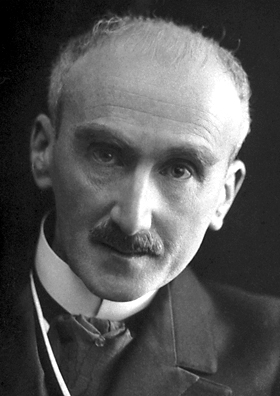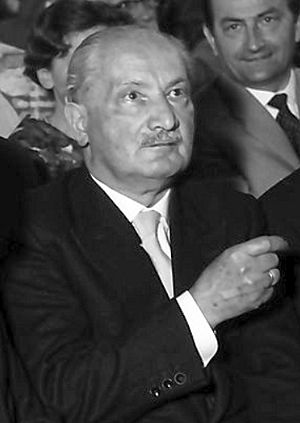Continental philosophy facts for kids
Continental philosophy is a way of thinking about big questions that started in mainland Europe. It's different from another main type of philosophy called analytic philosophy. There isn't one simple definition for continental philosophy.
Before the 1900s, "continental" just meant philosophy from Europe. But later, especially among English-speaking philosophers, the term changed. It began to describe a group of thinkers and ideas that weren't part of the analytic movement.
Continental philosophy includes many different ideas. Some examples are German idealism, phenomenology, existentialism (which explores human freedom and meaning), hermeneutics (the study of understanding), structuralism, post-structuralism, and critical theory.
The term continental philosophy doesn't have a super clear meaning. It's more like a "family resemblance" between different ideas. Some people even think the term was first used to describe philosophies that analytic philosophers didn't like. However, some thinkers, like Michael E. Rosen, have found common ideas. These ideas often come from Immanuel Kant's work. They suggest that our knowledge, experiences, and reality are shaped by certain conditions. We can understand these conditions best by thinking deeply about them, not just by scientific study.
Contents
What is Continental Philosophy?
The term continental philosophy became widely used in the 1970s. It described university courses in English-speaking countries. These courses covered popular philosophies from France and Germany. These included ideas like phenomenology, existentialism, structuralism, and post-structuralism.
However, the idea of "continental philosophy" goes back further. In 1840, John Stuart Mill used the term. He compared the ideas of "Continental philosophy" (influenced by Immanuel Kant) with English ideas that focused on experience.
In the early 1900s, philosophers like Bertrand Russell and G. E. Moore started a new way of thinking. They wanted philosophy to be more like science, using logical analysis. This became known as analytic philosophy. It became very popular in Britain and the United States after 1930. Russell and Moore didn't agree with Hegelianism and similar ideas.
In 1945, Russell pointed out differences between "Continental" and "British" philosophy. He saw these differences since the time of John Locke. Here are some of the main points he noted:
- In how they think: Continental philosophy often builds big systems of ideas. British philosophy tends to look at things piece by piece.
- In ideas about reality: Continental philosophy often involves rationalist religious ideas. British philosophy is more open to not knowing about ultimate reality.
- In ideas about right and wrong: Continental philosophy often focuses on duties and rules. British philosophy often focuses on what brings pleasure or happiness.
- In politics: Continental philosophy sometimes leans towards strong authority. British philosophy often supports liberalism and individual freedom.
Since the 1970s, many philosophers in the United States and Britain have become interested in continental thinkers. Also, philosophers in Europe have started to use ideas from the "analytic" movement. So, "Continental philosophy" is now more about a group of ideas and influences, rather than just a place.
Key Ideas of Continental Philosophy
Like "analytic philosophy," continental philosophy doesn't have one strict definition. It's more about shared ideas. Simon Glendinning suggested the term was first used to describe philosophies that analytic philosophers didn't like.
However, Michael E. Rosen has pointed out some common themes:
- Continental philosophers often don't believe that natural sciences are the only or best way to understand everything. Many analytic philosophers see their work as connected to science. But continental philosophers often argue that science relies on a deeper understanding of experience. They believe scientific methods can't fully explain these basic conditions of understanding.
- Continental philosophy usually thinks these conditions of experience can change. They are shaped by things like context, time, place, language, culture, or history. This means continental philosophy often looks at the history of ideas. While analytic philosophy often treats problems separately from their history, continental philosophy believes you can't separate ideas from when and where they came from.
- Continental philosophy often believes that people can change these conditions of experience. If human experience is created, it can be created in new ways. So, continental philosophers are often interested in connecting ideas with real-world actions. They often see their philosophical work as helping to change people or society. This is clear in Marxism (which says philosophers should change the world, not just interpret it). It's also important in existentialism and post-structuralism.
- Finally, continental philosophy often thinks about the nature of philosophy itself. After the success of the natural sciences, continental philosophers have often tried to redefine what philosophy is and how it works. Some, like German idealists or phenomenologists, see philosophy as a foundational science. Others, like those in hermeneutics or critical theory, believe philosophy explores cultural or practical areas. Some, like Søren Kierkegaard or Friedrich Nietzsche, even wonder if philosophy can truly reach its goals.
These ideas often come from Immanuel Kant's view. He thought that knowledge, experience, and reality are shaped by conditions. These conditions are best understood through deep philosophical thinking, not just by scientific study.
History of Continental Philosophy
The history of modern continental philosophy usually starts with German idealism. This movement grew from the work of Immanuel Kant in the late 1700s. Key figures included Fichte, Schelling, and later Hegel. It was connected to romanticism and the revolutionary ideas of the Age of Enlightenment.
Edmund Husserl is a very important figure in continental philosophy. His ideas about phenomenology are central. Even some analytic philosophers study his work.
J. G. Merquior suggested that the difference between analytic and continental philosophy became clear with Henri Bergson (1859–1941). Bergson was cautious about science and valued intuition. This helped pave the way for existentialism.
One example of the differences between these two styles of philosophy is a paper by Rudolf Carnap in 1932. Carnap argued that Martin Heidegger's ideas were confusing and didn't make logical sense. He claimed many German philosophers at the time wrote in ways that were meaningless.
When a difficult political group took power in Germany (the Nazis), many philosophers had to leave. Especially those who were Jewish or had different political views. Many went to English-speaking countries. Those who stayed had to deal with the new political control over universities. Some, like Martin Heidegger, even supported the new government.
French Philosophy in the 1900s
After World War II, there was a growing interest in German philosophy in France. People became interested in communism, which led to studying Karl Marx and Hegel. This was new for the French university system at the time.
Also, the ideas of Edmund Husserl and Martin Heidegger became very popular. This might be because French philosophy already valued the idea of a person's own perspective. The writer and philosopher Jean-Paul Sartre was very important in making phenomenology popular. He called his ideas existentialism.
Another big part of continental thought is structuralism and post-structuralism. Influenced by the study of language, French thinkers like Claude Lévi-Strauss started to apply structural ideas to other areas of human study. In the 1960s and 70s, post-structuralists like Jacques Derrida and Gilles Deleuze questioned structuralism.
Recent Developments in English-Speaking Countries
From the early 1900s until the 1960s, continental philosophers were not often discussed in British and American universities. This was true even though many continental philosophers came to the United States. These included thinkers like Hannah Arendt and Herbert Marcuse, who fled persecution and World War II.
However, in the late 1960s and 1970s, philosophy departments in English-speaking countries started offering courses in continental philosophy. Today, continental philosophy is a big part of many philosophy departments in the UK, Ireland, North America, and Australia.
Also, other university departments, like those for literature, fine arts, film, sociology, and political theory, have started using ideas from continental philosophers in their studies.
Important Books
- The Phenomenology of Spirit (1807) by Georg Wilhelm Friedrich Hegel
- Either/Or (1843) by Søren Kierkegaard
- The Concept of Anxiety (1844) by Søren Kierkegaard
- Logical Investigations (1901) by Edmund Husserl
- I and Thou (1923) by Martin Buber
- History and Class Consciousness (1923) by György Lukács
- Being and Time (1927) by Martin Heidegger
- Philosophy of Symbolic Forms (1929) by Ernst Cassirer
- Illuminations (1940) by Walter Benjamin
- Escape from Freedom (1941) by Erich Fromm
- Being and Nothingness (1943) by Jean-Paul Sartre
- Phenomenology of Perception (1945) by Maurice Merleau-Ponty
- Eclipse of Reason (1947) by Max Horkheimer
- Dialectic of Enlightenment (1947) by Max Horkheimer and Theodor W. Adorno
- The Second Sex (1949) by Simone de Beauvoir
- Minima Moralia (1951) by Theodor W. Adorno
- Prison Notebooks (1951) by Antonio Gramsci
- Eros and Civilization (1955) by Herbert Marcuse
- Mythologies (1957) by Roland Barthes
- The Human Condition (1958) by Hannah Arendt
- The Poetics of Space (1958) by Gaston Bachelard
- Du mode d'existence des objets techniques (1958) by Gilbert Simondon
- Truth and Method (1960) by Hans-Georg Gadamer
- Madness and Civilization (1961) by Michel Foucault
- Totality and Infinity (1961) by Emmanuel Levinas
- One-Dimensional Man (1964) by Herbert Marcuse
- For Marx (1965) by Louis Althusser
- Reading Capital (1965) by Louis Althusser, Étienne Balibar, Jacques Rancière, Roger Establet and Pierre Macherey
- Negative Dialectics (1966) by Theodor W. Adorno
- The Order of Things (1966) by Michel Foucault
- Ecrits (1966) by Jacques Lacan
- Society of the Spectacle (1967) by Guy Debord
- Writing and Difference (1967) by Jacques Derrida
- Of Grammatology (1967) by Jacques Derrida
- Difference and Repetition (1968) by Gilles Deleuze
- Archaeology of Knowledge (1969) by Michel Foucault
- Ideology and Ideological State Apparatuses (1970) by Louis Althusser
- Blindness and Insight (1971) by Paul de Man
- Anti-Oedipus: Capitalism and Schizophrenia (1972) by Gilles Deleuze and Félix Guattari
- Dissemination (1972) by Jacques Derrida
- Margins of Philosophy (1972) by Jacques Derrida
- Glas (1974) by Jacques Derrida
- Otherwise than Being or Beyond Essence (1974) by Emmanuel Levinas
- The Postmodern Condition (1979) by Jean-François Lyotard
- A Thousand Plateaus: Capitalism and Schizophrenia (1980) by Gilles Deleuze and Félix Guattari
- Simulacra and Simulation (1981) by Jean Baudrillard
- A Cyborg Manifesto (1985) by Donna Haraway
- Being and Event (1988) by Alain Badiou
- Gender Trouble (1990) by Judith Butler
- Technics and Time (1994) by Bernard Stiegler
See also
 In Spanish: Filosofía continental para niños
In Spanish: Filosofía continental para niños
- Index of continental philosophy articles
Images for kids
 | May Edward Chinn |
 | Rebecca Cole |
 | Alexa Canady |
 | Dorothy Lavinia Brown |





